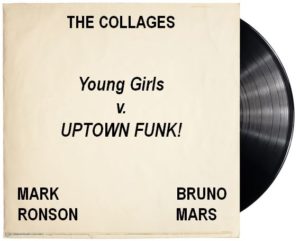DJ Mark Ronson and Bruno Mars Get “Funked” With New Copyright Suit Over “Uptown Funk”
 On Friday, October 28, 2016, musicians Mark Ronson and Bruno Mars were hit with a copyright infringement suit based on their wildly popular hit “Uptown Funk.” The plaintiffs, consisting of one living member and the estates of the 1980s funk group, Collage, assert that Ronson and Mars copied the bass line, guitar riff, and various other elements of Collage’s 1980s work “Young Girls.” In the complaint, the plaintiffs assert that the ensuing damage cannot be overstated due to the commercial success of “Uptown Funk.” The only remaining member of Collage and the estates of the deceased members of the band assert that there are eleven people that should be credited for “Uptown Funk,” whereby each party should receive royalties for Ronson and Mars’ allegedly copying.
On Friday, October 28, 2016, musicians Mark Ronson and Bruno Mars were hit with a copyright infringement suit based on their wildly popular hit “Uptown Funk.” The plaintiffs, consisting of one living member and the estates of the 1980s funk group, Collage, assert that Ronson and Mars copied the bass line, guitar riff, and various other elements of Collage’s 1980s work “Young Girls.” In the complaint, the plaintiffs assert that the ensuing damage cannot be overstated due to the commercial success of “Uptown Funk.” The only remaining member of Collage and the estates of the deceased members of the band assert that there are eleven people that should be credited for “Uptown Funk,” whereby each party should receive royalties for Ronson and Mars’ allegedly copying.
This lawsuit comes on the heels of last year’s controversial verdict out of the Central District of California where a jury found that Pharrell Williams and Robin Thicke’s “Blurred Lines” copied key elements from Marvin Gaye’s “Got to Give It Up.” See Pharrell Williams, et al v. Bridgeport Music Inc. et al, Case No. 2:13-cv-06004 (C.D. Cal. Mar. 10, 2015). That verdict departed from the traditional standards applied to cases involving copyright law and music in that the court subjectively considered intangible components such as the rhythm and “feel” of the song. Traditionally, courts applied a more tangible standard that considered similarities of lyrics, melody, and harmony. The judge awarded a $7.4 million verdict to Gaye’s estate and ongoing royalties to Gaye’s estate, which was later reduced to $5.4 million. Williams and Thicke are currently appealing this case to the Ninth Circuit, where 212 music artists have joined an amicus brief supporting the appeal because, as reported by the Hollywood Reporter, the verdict is “very dangerous to the music community, [and] is certain to stifle future creativity, and ultimately does a disservice to past songwriters as well.” In addition, musicologists have expressed by amicus brief that allowing the “Blurred Lines” verdict to stand is dangerous towards the music community.
The verdict in the “Blurred Lines” case has already demonstrated the potential danger artists face in the current music climate. If the “Uptown Funk” court applies the seemingly subjective considerations that were applied in the case of “Blurred Lines,” the proverbial floodgates for the estates of deceased artists to recover for minute similarities in modern songs, and consequently raise the potential of stifling creativity in the music industry, will have been opened. However, if the Court applies the traditional standards of copyright law in accordance with the appeal to the Ninth Circuit and the support of over 200 artists, it would “unblur” the imaginary line between the traditional and untested subjective standard.
See “Young Girls” by Collage: https://youtu.be/pfTr_fgQpvg
See also “Uptown Funk” by Bruno Mars and Mark Ronson: https://youtu.be/OPf0YbXqDm0
Authors
Brad M. Scheller
Member

Daniel Weinger


